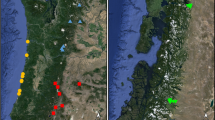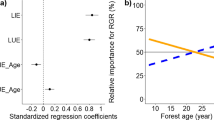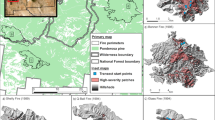Abstract
Fire has a key role in the ecology and evolution of many ecosystems, yet its effects on plant–insect interactions are poorly understood. Because interacting species are likely to respond to fire differently, disruptions of the interactions are expected. We hypothesized that plants that regenerate after fire can benefit through the disruption of their antagonistic interactions. We expected stronger effects on interactions with specialist predators than with generalists. We studied two interactions between two Mediterranean plants (Ulex parviflorus, Asphodelus ramosus) and their specialist seed predators after large wildfires. In A. ramosus we also studied the generalist herbivores. We sampled the interactions in burned and adjacent unburned areas during 2 years by estimating seed predation, number of herbivores and fruit set. To assess the effect of the distance to unburned vegetation we sampled plots at two distance classes from the fire perimeter. Even 3 years after the fires, Ulex plants experienced lower seed damage by specialists in burned sites. The presence of herbivores on Asphodelus decreased in burned locations, and the variability in their presence was significantly related to fruit set. Generalist herbivores were unaffected. We show that plants can benefit from fire through the disruption of their antagonistic interactions with specialist seed predators for at least a few years. In environments with a long fire history, this effect might be one additional mechanism underlying the success of fire-adapted plants.



Similar content being viewed by others
References
Alonso-Zarazaga MA (1990) Revision of the supraspecific taxa in the Palaearctic Apionidae Schoenherr, 1823 (Coleoptera, Curculionoidea). 2. Subfamily Apioninae Schoenherr, 1823: introduction, keys and descriptions. Graellsia 46:19–156
Andersen AN (1988) Immediate and longer-term effects of fire on seed predation by ants in sclerophyllous vegetation in south-eastern Australia. Aust J Ecol 13:285–293. doi:10.1111/j.1442-9993.1988.tb00976.x
Auld TD, Denham AJ (1999) The role of ants and mammals in dispersal and post-dispersal seed predation of the shrubs Grevillea (Proteaceae). Plant Ecol 144:201–213. doi:10.1023/A:1009817132378
Auld TD, O’Connell MA (1989) Changes in predispersal seed predation levels after fire for two Australian legumes, Acacia elongata and Sphaerolobium vimineum. Oikos 54:55–59. doi:10.2307/3565896
Ayal Y, Izhaki I (1993) The effect of the mirid bug Capsodes infuscatus on fruit production of the geophyte Asphodelus ramosus in a desert habitat. Oecologia 93:518–523. doi:10.1007/BF00328960
Baeza MJ, Vallejo VR (2006) Ecological mechanisms involved in dormancy breakage in Ulex parviflorus seeds. Plant Ecol 183:191–205. doi:10.1007/s11258-005-9016-0
Barat M, Tarayre M, Atlan A (2007) Plant phenology and seed predation: interactions between gorses and weevils in Brittany (France). Entomol Exp Appl 124:167–176. doi:10.1111/j.1570-7458.2007.00565.x
Bates D, Maechler M, Bolker B, Walker S (2015) Fitting linear mixed-effects models using lme4. J Stat Softw 67:1–48. doi:10.18637/jss.v067.i01
Bond WJ (1984) Fire survival of Cape Proteaceae-influence of fire season and seed predators. Plant Ecol 56:65–74. doi:10.1007/BF00033048
Bond WJ, van Wilgen BW (1996) Fire and plants, 1st edn. Chapman & Hall, London
Broncano MJ, Rodrigo A, Retana J (2008) Post-dispersal seed predation in Pinus halepensis and consequences on seedling establishment after fire. Int J Wildland Fire 17:407–414. doi:10.1071/WF07095
Cassis G, Schuh RT (2012) Systematics, biodiversity, biogeography, and host associations of the Miridae (Insecta: Hemiptera: Heteroptera: Cimicomorpha). Annu Rev Entomol 57:377–404. doi:10.1146/annurev-ento-121510-133533
Dafni A, Izhaki I, Ne’eman G (2012) The effect of fire on biotic interactions in Mediterranean basin ecosystems: pollination and seed dispersal. Isr J Ecol Evol 58:235–250. doi:10.1560/IJEE.58.2-3.235
Dantas VL, Batalha MA, Pausas JG (2013) Fire drives functional thresholds on the savanna-forest transition. Ecology 94:2454–2463. doi:10.1890/12-1629.1
Ehrlich PR, Murphy DD (1988) Plant chemistry and host range in insect herbivores. Ecology 69:908–909. doi:10.2307/1941244
Ewers RM, Didham RK (2006) Confounding factors in the detection of species responses to habitat fragmentation. Biol Rev Camb Philos Soc 81:117–142. doi:10.1017/S1464793105006949
Fuhlendorf SD, Engle DM, Kerby JAY, Hamilton R (2009) Pyric herbivory: rewilding landscapes through the recoupling of fire and grazing. Conserv Biol 23:588–598. doi:10.1111/j.1523-1739.2008.01139.x
Hendrix SD (1988) Herbivory and its impact on plant reproduction. In: Lovett Doust J, Lovett Doust L (eds) Plant reproductive ecology. Oxford University Press, Oxford, pp 246–263
Herrera CM, Pellmyr O (2002) Plant animal interactions: an evolutionary approach, 1st edn. Blackwell Science, Oxford
Izhaki I (2012) The impact of fire on vertebrates in the Mediterranean Basin: an overview. Isr J Ecol Evol 58:221–233. doi:10.1560/IJEE.58.2-3.221
Izhaki I, Maestro N, Meir D, Broza M (1996) Impact of the Mirid bug Capsodes infuscatus (Hemiptera: Miridae) on fruit production of the geophyte Asphodelus aestivus: the effect of plant density. Fla Entomol 79:510–520. doi:10.2307/3496063
Jaenike J (1990) Host specialization in phytophagous insects. Annu Rev Ecol Evol Syst 21:243–273. doi:10.1146/annurev.es.21.110190.001331
Keeley JE, Pausas JG, Rundel PW, Bond WJ, Bradstock RA (2011) Fire as an evolutionary pressure shaping plant traits. Trends Plant Sci 16:406–411. doi:10.1016/j.tplants.2011.04.002
Keeley JE, Bond WJ, Bradstock RA, Pausas JG, Rundell PW (2012) Fire in Mediterranean ecosystems: ecology, evolution and management, 1st edn. Cambridge University Press, Cambridge
Knight TM, Holt RD (2005) Fire generates spatial gradients in herbivory: an example from a Florida sandhill ecosystem. Ecology 86:587–593. doi:10.1890/04-1069
Larsson S, Ekbom B, Björkman C (2000) Influence of plant quality on pine sawfly population dynamics. Oikos 89:440–450. doi:10.1034/j.1600-0706.2000.890303.x
Lázaro A, Tscheulin T, Devalez J, Nakas G, Petanidou T (2016) Effects of grazing intensity on pollinator abundance and diversity, and on pollination services. Ecol Entomol. doi:10.1111/een.12310 (in press)
Lifante ZD (1996) Reproductive biology of Asphodelus aestivus (Asphodelaceae). Plant Syst Evol 200:177–191. doi:10.1007/BF00984934
Lopes CT, Vasconcelos HL (2011) Fire increases insect herbivory in a neotropical savanna. Biotropica 43:612–618. doi:10.1111/j.1744-7429.2011.00757.x
López-Vila JR, García-Fayos P (2005) Diplochory in Ulex parviflorus Pourr. Acta Oecol 28:157–162. doi:10.1016/j.actao.2005.03.008
Moreira B, Pausas JG (2012) Tanned or burned: the role of fire in shaping physical seed dormancy. PLoS One 7:e51523. doi:10.1371/journal.pone.0051523
Moreira B, Tormo J, Estrelles E, Pausas JG (2010) Disentangling the role of heat and smoke as germination cues in Mediterranean Basin flora. Ann Bot 105:627–635. doi:10.1093/aob/mcq017
Moretti M, Duelli P, Obrist MK (2006) Biodiversity and resilience of arthropod communities after fire disturbance in temperate forests. Oecologia 49:312–327. doi:10.1007/s00442-006-0450-z
New TR (2014) Insects, fire and conservation, 1st edn. Springer, New York
Ordóñez JL, Retana J (2004) Early reduction of post-fire recruitment of Pinus nigra by post-dispersal seed predation in different time-since-fire habitats. Ecography 27:449–458. doi:10.1111/j.0906-7590.2004.03886.x
Pantis JD, Mardiris TA (1992) The effects of grazing and fire on degradation processes of Mediterranean ecosystems. Israel J Bot 41:233–242. doi:10.1080/0021213X.1992.10677230
Pantis JD, Margaris NS (1988) Can systems dominated by asphodels be considered as semi-deserts? Int J Biometeorol 32:87–91. doi:10.1007/BF01044899
Paula S, Arianoutsou M, Kazanis D, Tavsanoglu Ç, Lloret F, Buhk C, Ojeda F, Luna B, Moreno JM, Rodrigo A, Espelta JM, Palacio S, Fernández-Santos B, Fernandes PM, Pausas JG (2009) Fire-related traits for plant species of the Mediterranean Basin: Ecological Archives E090-094. Ecology 90:1420. doi:10.1890/08-1309.1
Pausas JG (2004) Changes in fire and climate in the eastern Iberian Peninsula (Mediterranean basin). Clim Chang 63:337–350. doi:10.1023/B:CLIM.0000018508.94901.9c
Pausas JG, Keeley JE (2009) A burning story: the role of fire in the history of life. Bioscience 59:593–601. doi:10.1525/bio.2009.59.7.10
Pausas JG, Paula S (2012) Fuel shapes the fire-climate relationship: evidence from Mediterranean ecosystems. Global Ecol Biogeogr 21:1074–1082. doi:10.1111/j.1466-8238.2012.00769.x
Pausas JG, Bradstock RA, Keith DA, Keeley JE (2004) Plant functional traits in relation to fire in crown-fire ecosystems. Ecology 85:1085–1100. doi:10.1890/02-4094
Potts SG, Vulliamy B, Dafni A, Ne’eman G, O’Toole C, Roberts S, Willmer P (2003) Response of plant-pollinator communities to fire: changes in diversity, abundance and floral reward structure. Oikos 101:103–112. doi:10.1034/j.1600-0706.2003.12186.x
Radho-Toly S, Majer JD, Yates C (2001) Impact of fire on leaf nutrients, arthropod fauna and herbivory of native and exotic eucalypts in Kings Park, Perth, Western Australia. Austral Ecol 26:500–506. doi:10.1046/j.1442-9993.2001.01133.x
Rey PJ, Garrido JL, Alcántara JM, Ramírez JM, Aguilera A, García L, Manzaneda AJ, Fernández R (2002) Spatial variation in ant and rodent post-dispersal predation of vertebrate-dispersed seeds. Funct Ecol 16:773–781. doi:10.1046/J.1365-2435.2002.00680.X
Swengel AB (1996) Effects of fire and hay management on abundance of prairie butterflies. Biol Conserv 76:73–85. doi:10.1016/0006-3207(95)00085-2
Swengel AB (1998) Effects of management on butterfly abundance in tallgrass prairie and pine barrens. Biol Conserv 83:77–89. doi:10.1016/S0006-3207(96)00129-2
Swengel AB (2001) A literature review of insect responses to fire, compared to other conservation managements of open habitat. Biodivers Conserv 10:1141–1169. doi:10.1023/A:1016683807033
Tarayre M, Bowman G, Schermann-Legionnet A, Barat M, Atlan A (2007) Flowering phenology of Ulex europaeus: ecological consequences of variation within and among populations. Evol Ecol 21:395–409. doi:10.1007/s10682-006-9109-9
Verdú M, Pausas JG (2007) Fire drives phylogenetic clustering in Mediterranean Basin woody plant communities. J Ecol 95:1316–1323. doi:10.1111/j.1365-2745.2007.01300.x
Vickery PD (2002) Effects of the size of prescribed fire on insect predation of northern blazing star, a rare grassland perennial. Conserv Biol 16:413–421. doi:10.1046/j.1523-1739.2002.00494.x
Wan HY, Rhodes AC, St Clair SB (2014) Fire severity alters plant regeneration patterns and defense against herbivores in mixed aspen forests. Oikos 12:1479–1488. doi:10.1111/oik.01521
Wheeler AG (2001) Biology of the plant bugs (Hemiptera: Miridae): pests, predators, opportunists, 1st edn. Cornell University Press, New York
Whelan RJ, Main AR (1979) Insect grazing and post-fire plant succession in south-west Australian woodland. Aust J Ecol 4:387–398. doi:10.1111/j.1442-9993.1979.tb01566.x
Zwolak R, Pearson DE, Ortega YK, Crone EE (2010) Fire and mice: seed predation moderates fire’s influence on conifer recruitment. Ecology 91:1124–1131. doi:10.1890/09-0332.1
Acknowledgments
We thank M.A. Alonso-Zarazaga, J. Baixeras, J.V. Falcó-Gari, L. Vivas, S. Montagud Alario and M.A. Orrico for insect identification. We are grateful to Abel Rubira, Santiago Donat-Caerols, Miguel Adán, Alejandro (Dani) Ginart, Beatriz López Gurillo, Lucía Tortajada and José Vicente Pérez for their help in the field and in the laboratory. CIDE is a joint institute of the Spanish National Research Council (CSIC), the University of Valencia and the regional government of Valencia (Generalitat Valenciana). Generalitat Valenciana also provided detailed fire maps. This research was financed by projects TREVOL and FILAS (CGL2012-39938-C02-01, CGL2015-64086) from the Spanish Government and PROMETEO/2016/021 from Generalitat Valenciana. Y.G. was supported by an FPI scholarship (BES-2013-062728) from the Spanish Ministry of Economy and Competitiveness.
Author contribution statement
JGP conceived the idea, JGP and MCC designed the study. MCC and YG collected the data at field. YG performed the statistical analyses and wrote the first version of the manuscript. All authors contributed to the final version of the manuscript.
Author information
Authors and Affiliations
Corresponding author
Ethics declarations
Conflict of interest
We declare no conflict of interest.
Additional information
Communicated by Carlos L. Ballare.
Electronic supplementary material
Below is the link to the electronic supplementary material.
Rights and permissions
About this article
Cite this article
García, Y., Castellanos, M.C. & Pausas, J.G. Fires can benefit plants by disrupting antagonistic interactions. Oecologia 182, 1165–1173 (2016). https://doi.org/10.1007/s00442-016-3733-z
Received:
Accepted:
Published:
Issue Date:
DOI: https://doi.org/10.1007/s00442-016-3733-z




